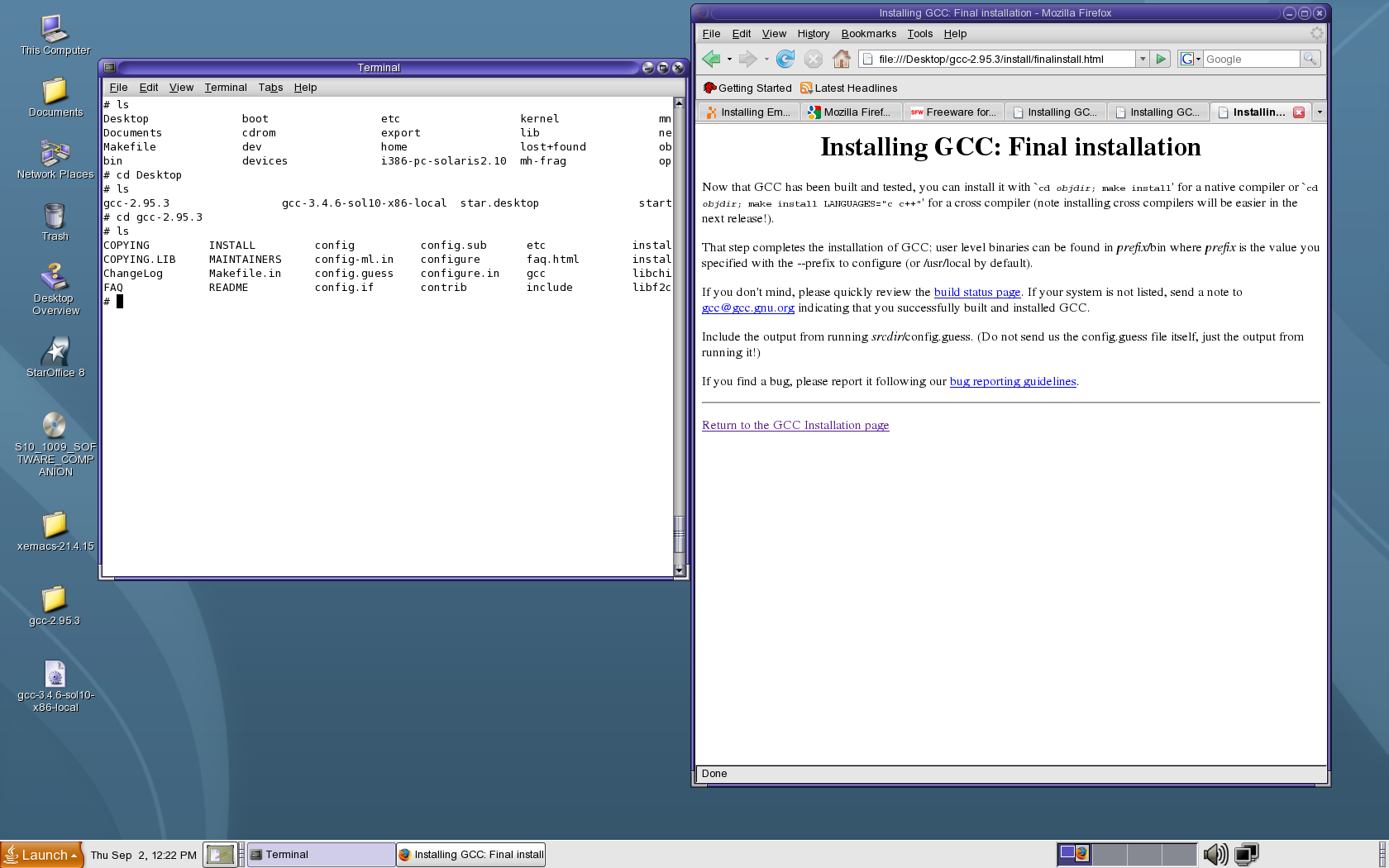How To Install Libgcc-3.4.6-sol9-sparc-local
5/7/2019
59 - Comments
How To Install Libgcc-3.4.6-sol9-sparc-local Rating: 9,3/10 3015 votes
PermalinkUnzip the packages and install the files using the following commands: For the GNU Compiler: # gunzip libgcc-3.4.6-sol9-sparc-local.gz # pkgadd -d libgcc-3.4.6-sol9-sparc-local. May 25, 2018 - Solaris9# pkgadd -d libgcc-3.4.6-sol9-sparc-local. Jan 09, 2011 UNIX and Linux shell scripting. Failed to install GMake on Solaris 9.
Join GitHub today
Mafia 2 kurtlar vadisi pusu yaması indir. Blackberry 9320 software download free. GitHub is home to over 36 million developers working together to host and review code, manage projects, and build software together.
Sign up

Branch:master
How To Install Libgcc-3.4.6-sol9-sparc-locals
Find file Copy path
Cannot retrieve contributors at this time
| Installing syslog-ng on Sun Solaris 10 |
| To successfully install syslog-ng, complete the following simple procedure. Lines starting with # are commands that have to be executed from a command line console. |
| Procedure 4.5. Installing syslog-ng on Sun Solaris 10 |
| 1. |
| Use the your username and password received together with your syslog-ng Premium Edition license to download the following binaries. Make sure to download the package specific for the processor architecture of the host. |
| * |
| The syslog-ng Premium Edition package (syslog-ng-premium-edition_<version>) from |
| http://www.balabit.com/downloads/files/syslog-ng/binaries/premium-edition/pool/s/syslog-ng-premium-edition/ |
| * |
| The libdbi8 package from |
| http://www.balabit.com/downloads/files/syslog-ng/binaries/premium-edition/pool/l/libdbi8/ |
| * |
| If you plan to use an SQL destination, download the package corresponding to your database from |
| http://www.balabit.com/downloads/files/syslog-ng/binaries/premium-edition/pool/l/libdbi8-drivers/ |
| Also download the package corresponding to the database, architecture, and Solaris version you plan to use from http://www.sunfreeware.com. The Sunfreeware.com website includes details on installing the database, and any required dependencies. |
| Note |
| The database packages contain the full database applications, but syslog-ng does not use the databases, only the .so file. Installing the database packages does not start the database services. |
| 2. |
| Download or copy the syslog-ng_<version_number>_sparc.pkg.gz package to your computer running Solaris. |
| Download the following packages from the nearest sunfreeware.com mirrors(solaris9 packages): |
| libiconv-1.11-sol9-sparc-local.gz |
| libgcc-3.4.6-sol9-sparc-local.gz |
| 3. |
| Unpack and install the syslog-ng Premium Edition and the libdbi8 package by issuing the following commands from the command line: |
| # libiconv-1.11-sol9-sparc-local.gz |
| # libgcc-3.4.6-sol9-sparc-local.gz |
| # gunzip syslog-ng_<version_number>_sparc.pkg.gz |
| # gunzip libdbi8_<version>_<arch>.gz |
| # pkgadd -d libiconv-1.11-sol9-sparc-local |
| # pkgadd -d libgcc-3.4.6-sol9-sparc-local |
| # pkgadd -d syslog-ng_<version_number>_sparc.pkg |
| # pkgadd -d libdbi8_<version>_<arch>.pkg |
| 4. |
| If you use an SQL destination, issue the commands corresponding to the database: |
| * |
| For MySQL: |
| Download and install the following packages from sunfreeware.com: |
| - mysql-5.0.41-sol9-sparc-local |
| - openssl-0.9.8e-sol9-sparc-local |
| # gunzip <pkg>.gz; pkgadd -d <pkg> |
| # gunzip libdbd8-mysql_<version>_<arch>.gz |
| # pkgadd -d libdbd8-mysql_<version>_<arch>.pkg |
| * |
| For PostgreSQL: |
| Make sure that the SUNWpostgr-libs package has been installed. It's on the Solaris 10 install DVD. |
| # gunzip libdbd8-pgsql_<version>_<arch>.gz |
| # pkgadd -d libdbd8-pgsql_<version>_<arch>.pkg |
| * |
| For SQLite: |
| Download and install the sqlite-3.3.6-sol9-sparc-local package from sunfreeware.com. |
| # gunzip sqlite-3.3.6-sol9-sparc-local.gz |
| # pkgadd -d sqlite-3.3.6-sol9-sparc-local |
| # gunzip libdbd8-sqlite_<version>_<arch>.gz |
| # pkgadd -d libdbd8-sqlite_<version>_<arch>.pkg |
| 5. |
| Rename the syslog-ng.conf.sample file (located under /opt/syslog-ng/etc/) to syslog-ng.conf. |
| # mv /opt/syslog-ng/etc/syslog-ng.conf.sample |
| /opt/syslog-ng/etc/syslog-ng.conf |
| 6. |
| Modify the syslog-ng.conf.to suit your needs. For details on how to configure syslog-ng, see The syslog-ng Administrator Guide, Chapter 3, Configuring syslog-ng. |
| 7. |
| Disable the original syslogd application. |
| # svcadm -v disable svc:/system/system-log |
| 8. |
| Copy the following files to their proper places by issuing the following commands and modify them if needed. |
| # cp /opt/syslog-ng/doc/syslog-ng.example.xml /var/svc/manifest/system/syslog-ng.xml |
| # cp /opt/syslog-ng/doc/syslog-ng.method /lib/svc/method/syslog-ng |
| 9. |
| Validate and import the syslog-ng.xml file using svccfg. |
| # svccfg |
| svc:> validate /var/svc/manifest/system/syslog-ng.xml |
| svc:> import /var/svc/manifest/system/syslog-ng.xml |
| svc:> quit |
| 10. |
| Enable and start syslog-ng. |
| # svcadm enable -t svc:/system/syslog-ng |
| 11. |
| Verify that syslog-ng is running. |
| # svcs -a grep syslog |
| You should receive a similar output: online 10:15:01 svc:/system/syslog-ng:default |
Copy lines Copy permalink